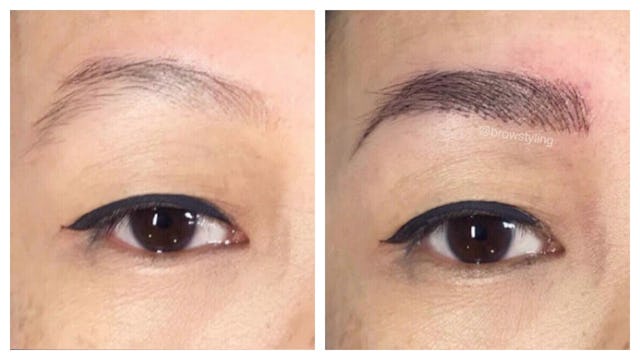What You Need To Know About Microblading

In the past few years, you may have noticed that microblading, a semi-permanent procedure that involves injecting ink into your eye brows to help fill in sparse brows, has increased in popularity and is now one of the hottest beauty trends. There’s power in the brows.
I love a good brow job, but there are things you should know before getting your brows inked. Your brow artist wants you to be aware of these things as well, so you have realistic expectations.
Yes, a brow tat plumps up your brows and leaves them looking fabulous, but this isn’t anything to mess around with as it’s not much different than getting a standard tattoo. The procedure involves getting tiny cuts in your skin and having ink injected into the upper skin. But you know what’s not fabulous? Infections. And having someone inject ink into your face when they aren’t qualified to do so puts you at major risk.
So before you take the plunge, here’s what you need to know about microblading:
1. Do your research.
Yes, this is a semi-permanent procedure and will not be with you forever, but that doesn’t mean things can’t go wrong. Annie Lam, Canada’s leading brow microblader, says when it comes to microblading, don’t skimp on your research. She’s worked on celebrities, as well as chemotherapy patiences, and she says it’s imperative to find a technician who is trained and certified since microblading is a beauty procedure that doesn’t require a license.
Lam says to first ask where they have been trained and if they are certified by that training academy. If their answer is no, move on until you find someone who has more experience.
2. Ask to see the technician’s work.
Lam recommends asking the technician if you can see their work — they should be more than willing to show you pictures of past clients. It will not only make you feel comfortable that they know what they’re doing, it can give you a chance to see if you “like their visual aesthetics and if it matches what you are looking for,” says Lam. Many of the most reputable and skilled artists are active on social media, and happy to show off their work.
3. Go to a reputable salon.
Make sure you also look into the salon and are having your work done in an establishment that follows the health and safety guidelines and has passed a city inspection — licensing should be visible to you when you walk in and inspection papers should be accessible and shown to you if you ask for them.
Lam says, “Your technician should always be using new, single use blades and fresh ink for each client every single time.” This is a form of tattooing, so don’t mess around.
4. Know what’s happening before the work is being done.
Do not go in without having a sense of what your brows are going to look like. Before the session starts, Lam says your technician should show you the shape of your brows and test color on your skin before they get to work.
Also, there are often things you need to do to prepare for your appointment such as no blood thinners or booze 24 hours before the procedure. You’ll also want to stay out of the tanning bed (please stay out of the tanning bed anyway) and avoid retinol in the month leading up to your new brows.
5. Your brows will fade.
This is why it’s important to make sure your technician is using high quality inks that will “fade out naturally into a lighter shade of your original color,” Lam says.
6. Ask your technician to leave some spacing.
After a few months your brows may look too “filled in” and lose that hair stroke look. Lam says this happens when your technician doesn’t leave enough empty space between each stroke. Make sure they use enough spacing so you maintain the natural hair look as the months pass.
7. Be aware of side effects.
Microblading is done by using small micro cuts, and if it’s done by someone who doesn’t have the proper training, it can cause scarring. Keep in mind your skin needs four weeks to heal so you should never get touch-ups until the four-week mark has passed.
8. You must follow after care instructions from your artist.
It’s imperative to follow them if you want your brows to heal properly and retain their color. That means “no makeup, skin creams, or cleansers on your new brows,” says Lam. Clean them twice a day with water, a cotton swab, and an unscented soap (although the soap is not necessary). And never, ever pick at your eyebrow scabs. Using acid toners, retinol, and other serums can also cause your eyebrows to fade out more quickly too. So, just make sure ask questions and feel confident about how to care for your new brows.
It’s amazing how the shape and look of our brows can change our face and give us that lift we need. If you are going to invest your time and money into getting your brows done, make sure you don’t skimp. It’s better to invest the time and money into finding a skilled technician than to risk infection, scaring, and bad brows.
This article was originally published on